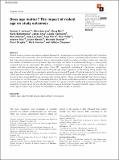Does age matter? The impact of rodent age on study outcomes
Abstract
Rodent models produce data which underpin biomedical research and non-clinical drug trials, but translation from rodents into successful clinical outcomes is often lacking. There is a growing body of evidence showing that improving experimental design is key to improving the predictive nature of rodent studies and reducing the number of animals used in research. Age, one important factor in experimental design, is often poorly reported and can be overlooked. The authors conducted a survey to assess the age used for a range of models, and the reasoning for age choice. From 297 respondents providing 611 responses, researchers reported using rodents most often in the 6–20 week age range regardless of the biology being studied. The age referred to as ‘adult’ by respondents varied between six and 20 weeks. Practical reasons for the choice of rodent age were frequently given, with increased cost associated with using older animals and maintenance of historical data comparability being two important limiting factors. These results highlight that choice of age is inconsistent across the research community and often not based on the development or cellular ageing of the system being studied. This could potentially result in decreased scientific validity and increased experimental variability. In some cases the use of older animals may be beneficial. Increased scientific rigour in the choice of the age of rodent may increase the translation of rodent models to humans.
Citation
Jackson , S J , Andrews , N , Ball , D , Bellantuono , I , Gray , J , Hachoumi , L , Holmes , A , Latcham , J , Petrie , A , Potter , P , Rice , A , Ritchie , A , Stewart , M , Strepka , C , Yeoman , M & Chapman , K 2017 , ' Does age matter? The impact of rodent age on study outcomes ' , Laboratory Animals , vol. 51 , no. 2 , pp. 160-169 . https://doi.org/10.1177/0023677216653984
Publication
Laboratory Animals
Status
Peer reviewed
ISSN
0023-6772Type
Journal article
Collections
Items in the St Andrews Research Repository are protected by copyright, with all rights reserved, unless otherwise indicated.

